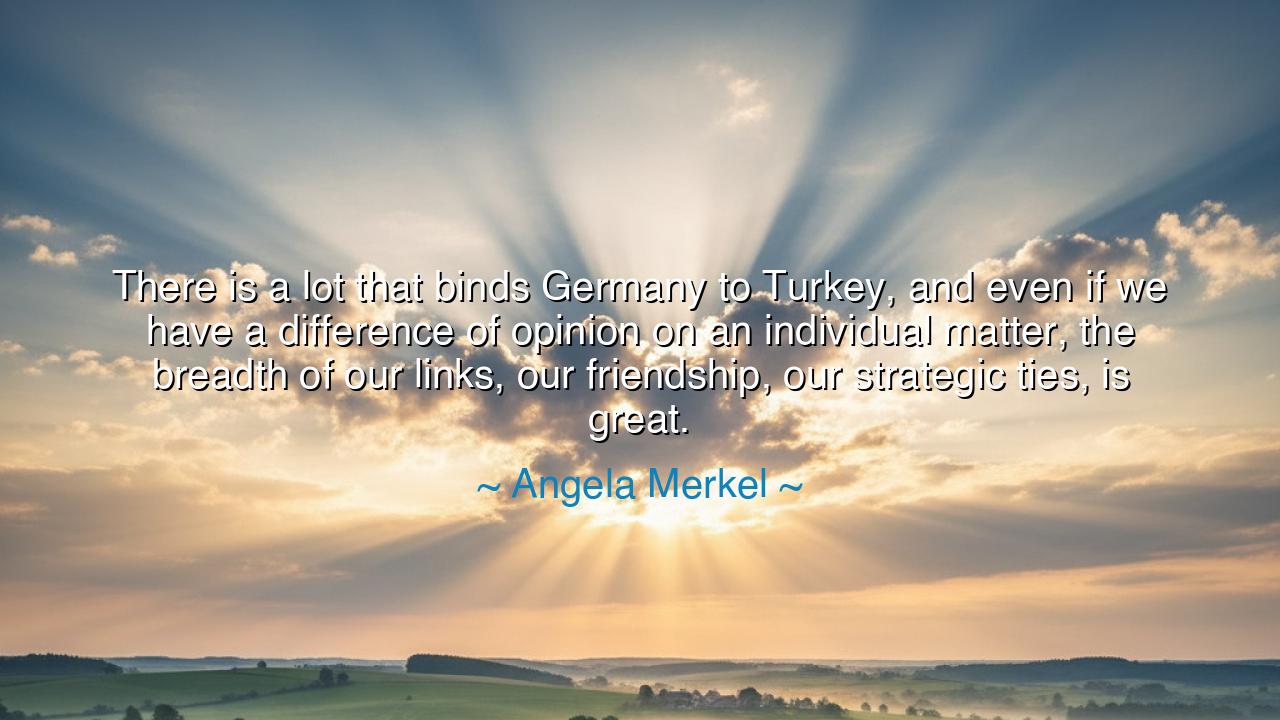
There is a lot that binds Germany to Turkey, and even if we have
There is a lot that binds Germany to Turkey, and even if we have a difference of opinion on an individual matter, the breadth of our links, our friendship, our strategic ties, is great.






In the eternal tapestry of human history, there are relationships that transcend time, differences, and challenges. Angela Merkel, the wise leader of Germany, speaks of one such enduring bond between Germany and Turkey: “There is a lot that binds Germany to Turkey, and even if we have a difference of opinion on an individual matter, the breadth of our links, our friendship, our strategic ties, is great.” In these words, we find a profound truth—true friendship and alliances are not defined by singular moments of disagreement or conflict, but by the depth and breadth of the connections that unite us. It is not the passing differences that determine the strength of a relationship, but the shared values, goals, and history that sustain it.
The ancients understood this well. The Greeks, whose city-states were often in conflict, nonetheless recognized the importance of alliances when the need arose. Sparta and Athens, rivals on the battlefield, found common ground when facing the greater threat of Persian expansion. They joined forces, setting aside their differences for the sake of greater unity. The bond between Germany and Turkey, as Merkel rightly points out, is not fragile or easily severed by differences of opinion; it is fortified by the deep, strategic ties that both nations have woven together over time. It is these ties, rooted in mutual respect and shared interest, that bind them together in ways that go beyond individual moments of disagreement.
The relationship between Germany and Turkey is a rich tapestry of history, from the days of the Ottoman Empire to the present. The Ottoman Empire and the German Empire shared alliances in the early 20th century, and the relationship between the two nations has evolved over the years, marked by both cooperation and tension. But through it all, the strategic partnership has endured. This is not the work of fleeting moments or superficial gestures; it is a bond shaped by shared purpose, whether in the fields of trade, defense, or cultural exchange. Even when the nations disagreed, as Merkel states, the breadth of their relationship—their mutual interests—has always provided a foundation strong enough to withstand the tests of time.
Consider the ancient alliances formed by Rome and its neighbors. The Romans, though known for their military might, also understood the power of diplomacy and alliances. They would often form strategic ties with various tribes and kingdoms, binding them through mutual trade and defense pacts. These alliances were not fragile; they were rooted in mutual benefit and long-term cooperation, much like the bond between Germany and Turkey today. The lesson here is clear: true alliances are not dependent on the fleeting winds of disagreement but are built on the enduring foundation of shared goals and long-term vision.
Merkel’s reflection also teaches us the value of resilience in relationships. In the face of disagreement or differing opinions, it is easy for the ties that bind to fray, to let the small differences overshadow the larger purpose. But Germany and Turkey have proven that even in moments of tension, the strength of their relationship lies in the breadth of their links—in the understanding that they are partners in a larger global context. Strategic ties—whether in diplomacy, security, or trade—are what sustain nations, just as friendships are sustained by the deeper bonds that lie beneath the surface. Resilience in relationships is not about ignoring differences, but about recognizing that unity comes from shared vision, even amidst disagreement.
In our own lives, we can take this wisdom to heart. We are often faced with conflict in our relationships—whether in friendships, families, or professional partnerships. In these moments, it is tempting to allow disagreements to dictate the course of our relationships, to let the smaller disputes overshadow the larger connections that we share. But true bonds are not defined by our ability to agree at every turn. They are defined by our commitment to one another, to the larger goals and values that unite us. Just as Germany and Turkey have done, we must learn to embrace our differences without allowing them to sever the ties that bind us.
Thus, the lesson is clear: true alliances, whether between nations or individuals, are built not on perfect harmony but on the strength of shared purpose. We must cherish the bonds that sustain us, even when the road is not always smooth. Just as Merkel reminds us, it is not the disagreements that define our relationships, but the breadth of our connections, the strategic ties, and the commitment to mutual interest that will endure. In our own lives, let us strive to create relationships that are resilient—strong enough to withstand the test of time, grounded in shared goals and common vision, so that when differences arise, we can move through them with understanding and unity.






AAdministratorAdministrator
Welcome, honored guests. Please leave a comment, we will respond soon